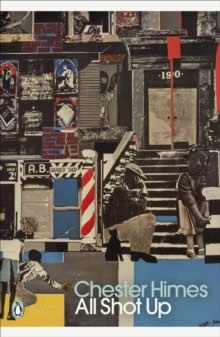All Shot Up

Editorial Penguin UK
Colección Modern Classics, Número 0
Fecha de edición marzo 2021 · Edición nº 1
Idioma inglés
EAN 9780241521120
208 páginas
Libro
encuadernado en tapa blanda
Dimensiones 129 mm x 198 mm
Resumen del libro
A golden Cadillac big enough to cross the ocean has been seen sailing along the streets of Harlem. A hit-and-run victim's been hit so hard she got embedded in the wall of a convent. A shootout with three heistmen dressed as cops has left an important politician in a coma - and a lot of money missing.
And Grave Digger Jones and Coffin Ed Johnson are the ones who have to piece it all together.All Shot Up is chaotic, bloody - and completely unforgettable. Chester Himes wrote detective fiction darker, dirtier and more extreme than anyone else dared.
Biografía del autor
Chester Himes, in full Chester Bomar Himes, (born July 29, 1909, Jefferson City, Mo., U.S. died Nov. 12, 1984, Moraira, Spain), African-American writer whose novels reflect his encounters with racism. As an expatriate in Paris, he published a series of black detective novels.<br><br>The domination of his dark-skinned father by his light-skinned mother was a source of deep resentment that shaped Himes's racial outlook. The family's frequent relocations, as well as the accidental blinding of his brother, further disrupted his childhood. Himes attended Ohio State University. From 1929 to 1936 he was jailed at the Ohio State Penitentiary for armed robbery, and while there he began to write fiction. A number of his stories appeared in Esquire and other American magazines. After his release from prison, he worked at numerous odd jobs and joined the Works Progress Administration, eventually serving as a writer with the Ohio Writers' Project.<br><br>His first novel, If He Hollers Let Him Go (1945), details the fear, anger, and humiliation of a black employee of a racist defense plant during World War II. Lonely Crusade (1947) concerns racism in the labour movement. Cast the First Stone (1952) portrays prison life, and The Third Generation (1954) examines family life.








